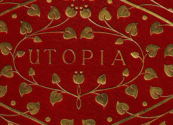Logic & Perfection
by Rachel Eckhardt
A question occurred to me while reading Candide: Is Pangloss only a critique of Leibniz’s best of all possible worlds tautology, or is Pangloss a walking critique of logical thinking itself? My current thinking is that Candide is a more ambiguous discussion of the nature of human existence, where physical suffering is used to debunk the so-called perfect world, but also human longing leads to the abandonment of the nearly perfect Eldorado.
Logic, a favorite of enlightenment thinking, is what Pangloss is using in his assertion that this is the best of all possible worlds. Reminiscent of the contemporary new age assertion that everything happens for a reason, I am interested in the discussion as it highlight the impossibility of perfection, in fact it reveals the absurdity of the idea of a perfect society. Yet even as Candide comes up against example after example of reasons to question the notion that this is the best of all possible worlds, he also experiences Eldorado, a tiny isolated utopia where the gems and minerals Europeans view as riches are not seen as anything special. Despite its peace and ease, Candide choses not to stay in Eldorado. We could conclude from his decision to leave that even the seemingly perfect garden is lacking something important, kind of like the way the initial paradise in Rasselas was unsatisfying.
So then I was wondering if Voltaire is using the three gardens, at the beginning, middle, and end of the book, to argue that at least happiness is possible in this world. Maybe seeking perfection is the enemy of happiness. Candide gets kicked out of the first garden, enjoys the Eldorado garden but chooses to leave, and finally is resigned to the third garden where manual labor allows for some contentedness and freedom from philosophical speculations.
Adorno and Horkheimer assert “On their way toward modern science human beings have discarded meaning. The concept is replaced by the formula, the cause by rules and probability. Causality was only the last philosophical concept on which scientific criticism tested its strength, because it alone of the old ideas still stood in the way of such criticism, the latest secular form of the creative principle” (3). The formulaic nature of the assertion that this is the best of all possible worlds is exactly where meaning is lost: Because this is the world that exists, it is better than any imaginary world.
Logic is central to utopian thinking because so much of utopian thought is about system building. The argument seems to be that if we could just be more rational, we would arrive at our destined perfection. But it is the emotional that is lacking, or maybe even the non-rational. It is certainly illogical for Candide to leave Eldorado, so why does he do it? Because the idea of returning to Europe with great wealth is irresistible, or the idea of living without his love spoils what is otherwise a paradise? Either way, it is not logic that he persues, and maybe the suggestion that while a perfect society is possible, it is not actually desirable.
What is most promising to me about this investigation is the question of alternatives to logic. If logic and perfectability fail us, what choice to do we have other than to be content with society as it is? Or to pursue non-rational approaches to living together as a society? This suggests other ways of knowing. Adorno and Horkheimer describe Bacon’s idea of enlightenment “The “happy match” between human understanding and the nature of things that he envisaged is a patriarchal one: the mind, conquering superstition, is to rule over disenchanted nature” (2). Investigating the irrational could suggest explanations for why we always leave the perfect garden. Contrary to Enlightenment thinking, the perfect society for humans would have to have space for the irrational, but is Candide’s abandonment of philosophy an argument for the non-rational society? It seems more like a survival tactic for all the the trauma he faced throughout the novel.


